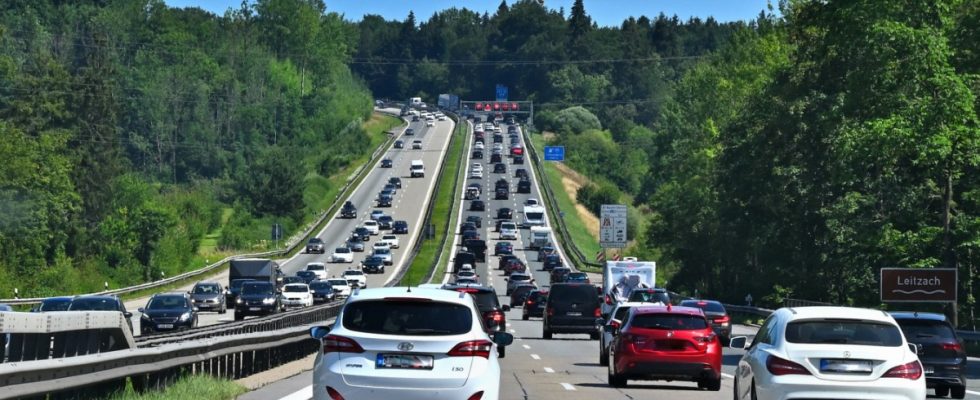In the traffic jam warnings of the ADAC, the A 8 between Munich and Salzburg is set in these weeks – next weekend because the summer holidays are coming to an end in three northern federal states and in the north of the Netherlands. It is almost undisputed that Bavaria’s oldest autobahn, which essentially dates back to the 1930s, is to be renewed in sections. Larger expansion plans, such as those promoted by the Federal Ministry of Transport, meet not only with a lot of approval but also with resistance in the region. An updated cost estimate for this and other federal transport projects is now fueling criticism, especially from the Greens.
The current Federal Transport Routes Plan, which lists all major transport projects up to 2030, shows total costs of more than 1.8 billion euros for an extensive expansion of the A 8 from the south of Munich to the border near Salzburg. In a current interim report for the Bundestag, the federal government has now updated these figures. According to this, the Ministry of Transport now expects more than 3.6 billion euros for a complete expansion of the A 8, which means that the costs will roughly double.
The A 8 is only one of the most obvious projects. According to the ministry’s interim report, countless other projects in Bavaria and throughout Germany are also likely to become extremely expensive. The expansion of the A 99 east of Munich will now cost 954 million euros instead of the previous 348 million. The expansion of the Nürnberg-Ost motorway junction is now planned with more than 160 million euros instead of 59 million, the expansion of the A 3 between Nittendorf and Rosenhof near Regensburg should now cost 933 million euros instead of 371 million.
A main reason for this is the calculation basis. In August 2016, the Bundestag passed the Federal Transport Infrastructure Plan 2030 presented by the black-red federal government at the time. The cost estimates are based on construction prices in 2014. In the meantime, construction prices have risen sharply in general – not only for private builders, but also for public and federal countries and municipalities. In view of this, the ministry is expressly pointing out to the parliamentarians that for those projects that are to be implemented later, even higher cost increases are likely to be expected than for projects that are to be implemented earlier. In 2022 alone, for example, the construction costs for trunk roads rose by 16.6 percent, from 2016 to 2022 by a total of 45.3 percent. According to the Ministry, the current estimates do not include future increases, which are still to be expected.
The Greens in particular reacted to the new figures with severe criticism. According to Leon Eckert, member of the Bundestag in Freising, the report shows where an incorrect prioritization can lead. “The oversized and outdated proportion of road construction projects” still devour more billions, which were then missing for the expansion of the railways. A reassessment of all projects based on the new figures is therefore necessary. “Anyone who counts on cost estimates from almost ten years ago is lying to themselves and the taxpayers in the end.” The traffic policy spokesman for the Greens in the state parliament, Markus Büchler, repeats his demand for an expansion and new construction freeze for all roads in the Free State in view of the new cost estimate. “The road network in Bavaria has been completely expanded,” the money previously earmarked for this must be reallocated “for the renovation of the dilapidated rail network.”
At the same time, rail projects are becoming more and more expensive. Three years ago, for example, Deutsche Bahn stated the total costs for the double-track expansion and the electrification of the Munich-Mühldorf-Freilassing route at 2.3 billion euros. The Federal Ministry of Transport now puts them at just under 4.1 billion. In the case of many rail projects, it is difficult to make a direct cost comparison in the interim report because the federal government does not bear part of the costs directly, but assumes them indirectly via the state-owned DB.
From the point of view of the Greens, the expansion of the railway would be far more important than that of trunk roads such as the A8. They absolutely need noise protection and a continuous hard shoulder from Rosenheim to the border, but no six-lane “monster expansion”, says Gisela Sengl, member of the Traunstein state parliament. In contrast to the other plans for the A 8, the two additional lanes from Traunstein to the border for 568 million euros and now 878 million euros are not at the top of the federal government’s priority list anyway.

